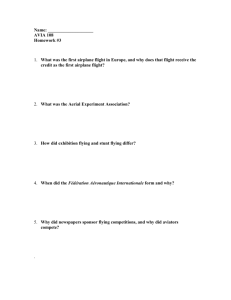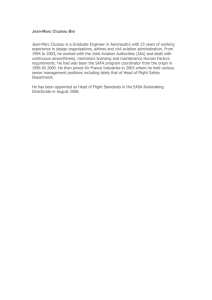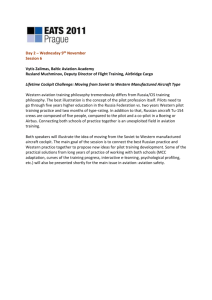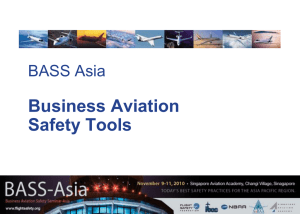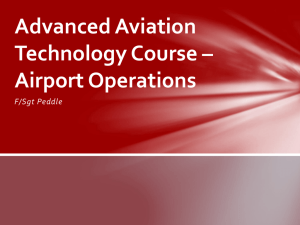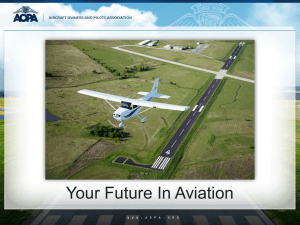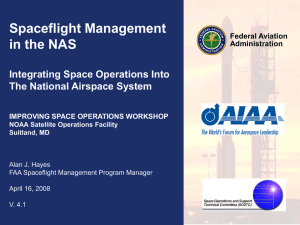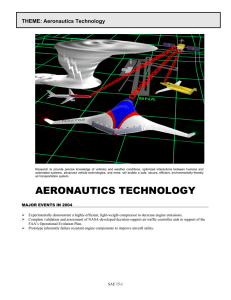DOC - Florida Community College at Jacksonville
advertisement
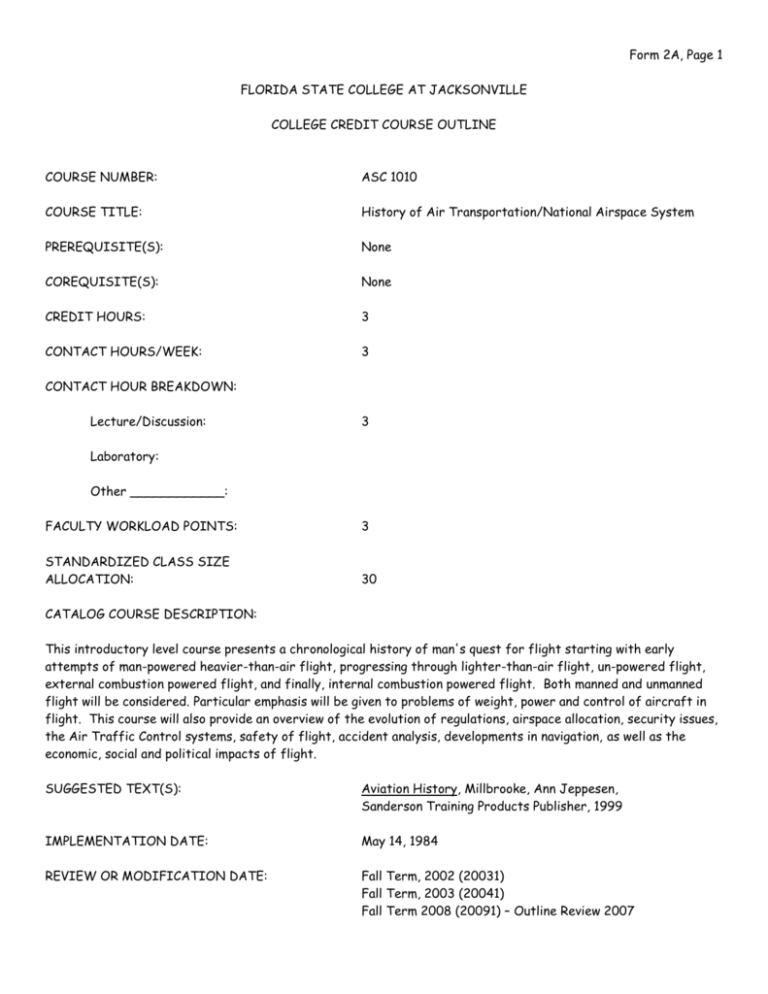
Form 2A, Page 1 FLORIDA STATE COLLEGE AT JACKSONVILLE COLLEGE CREDIT COURSE OUTLINE COURSE NUMBER: ASC 1010 COURSE TITLE: History of Air Transportation/National Airspace System PREREQUISITE(S): None COREQUISITE(S): None CREDIT HOURS: 3 CONTACT HOURS/WEEK: 3 CONTACT HOUR BREAKDOWN: Lecture/Discussion: 3 Laboratory: Other ____________: FACULTY WORKLOAD POINTS: 3 STANDARDIZED CLASS SIZE ALLOCATION: 30 CATALOG COURSE DESCRIPTION: This introductory level course presents a chronological history of man's quest for flight starting with early attempts of man-powered heavier-than-air flight, progressing through lighter-than-air flight, un-powered flight, external combustion powered flight, and finally, internal combustion powered flight. Both manned and unmanned flight will be considered. Particular emphasis will be given to problems of weight, power and control of aircraft in flight. This course will also provide an overview of the evolution of regulations, airspace allocation, security issues, the Air Traffic Control systems, safety of flight, accident analysis, developments in navigation, as well as the economic, social and political impacts of flight. SUGGESTED TEXT(S): Aviation History, Millbrooke, Ann Jeppesen, Sanderson Training Products Publisher, 1999 IMPLEMENTATION DATE: May 14, 1984 REVIEW OR MODIFICATION DATE: Fall Term, 2002 (20031) Fall Term, 2003 (20041) Fall Term 2008 (20091) – Outline Review 2007 Form 2A, Page 2 COURSE TOPICS I. CONTACT HOURS __PER TOPIC__ Man’s Efforts to Fly 3 Development of the Airplane 6 III. Importance of Air Transportation 3 II. IV. The Beginning of Commercial Air Transportation V. The Air Carrier Industry VI. Federal Legislation, Airspace, and Security VII. VIII. IX. X. XI. XII. 3 3 6 The Department of Transportation 3 The Federal Aviation Act - 1958 3 The Federal Aviation Administration 6 The National Transportation Safety Board 3 The Civil Aeronautics Board 3 Deregulation 3 Form 2A, Page 3 PROGRAM TITLE: Aviation Maintenance Management COURSE TITLE: History of Air Transportation/National Airspace System CIP NUMBER: 1649.010401 List performance standard addressed: NUMBER(S): TITLE(S): 44.0 DEMONSTRATE KNOWLEDGE OF FAA AIRCRAFT MECHANIC LICENSING REQUIREMENTS—The student will be able to: 44.01 Successfully complete the FAA powerplant written, oral and practical examinations. 44.02 Display an FAA powerplant Mechanic’s certificate. 44.03 Successfully complete the FAA airframe written, oral and practical examinations. 44.04 Display an FAA airframe mechanic’s certificate. 45.0 DEMONSTRATE THE HUMAN RELATIONS SKILLS NECESSARY FOR SUCCESS IN SUPERVISION—The student will be able to: 45.01 Exhibit the ability to get along with others. 45.02 Discuss the importance of human relations. 45.03 Develop and demonstrate the unique human relations skills needed for successful entry and progress in supervising others. 46.0 DEMONSTRATE KNOWLEDGE OF SKILLS AND ATTITUDES THE SUPERVISOR NEEDS FOR EFFECTIVE PERFORMANCE—The student will be able to: 46.01 Describe leadership theory and its complexity. 46.04 Discuss pertinent legislation and the role of government intervention. 48.0 DEMONSTRATE APPROPRIATE COMMUNICATION SKILLS—The student will be able to: 48.01 Write logical and understandable statements, or phrases, to accurately fill out forms/invoices commonly used in business and industry. Form 2A, Page 4 PROGRAM TITLE: Aviation Operations COURSE TITLE: History of Air Transportation/National Airspace System CIP NUMBER: 1649.010401 LIST PERFORMANCE STANDARD ADDRESSED: NUMBER(S): TITLE(S): 04.0 DEMONSTRATE UNDERSTANDING OF FEDERAL AVIATION ADMINISTRATION, STATE AND OTHER GOVERNMENTAL LAWS, RULES AND POLICIES—The student will be able to: 04.01 Describe the economic, social and political importance of commercial aviation, general aviation and aircraft manufacturing in the United States. 04.02 Describe the function, basic organization and responsibility of the National Transportation Safety Board. 04.03 Explain major portions of Parts 1, 61, 67, 77, 91, 830 and FAR Parts 108 and 139 of the Federal Aviation Regulations. 04.04 List and describe the federal statutes pertaining to the economic regulation of the airline industry. 04.05 List and describe the major federal statutes pertaining to the regulation of aviation safety. 04.06 Describe the historical and current relationship between the U.S. Post Office and the aviation industry. 04.07 List and describe six categories of general aviation. 04.08 Describe the development of aviation laws and their analogy to the Law of the Sea. 04.09 Explain the Department of Transportation, State of Florida, and its structure as relates to the aircraft industry. 08.0 DEMONSTRATE APPROPRIATE COMMUNICATION SKILLS—The student will be able to: 08.01 Write logical and understandable statements, or phrases, to complete with accuracy the forms/invoices commonly used in business and industry. 08.02 Read and understand graphs, charts, diagrams, and tables commonly used in this industry/occupation area. 08.03 Read and follow written and oral instructions. 08.04 Answer and ask questions coherently and concisely. 08.05 Read critically by recognizing assumptions and implications and by evaluating ideas. 08.06 Demonstrate appropriate telephone/communication skills. Florida State College At Jacksonville Course Learning Outcomes & Assessment For All College Credit Courses NOTE: Use either the Tab key or mouse click to move from field to field. The box will expand to accommodate your entry. Section 1 COURSE PREFIX AND NUMBER: ASC 1010 SEMESTER CREDIT HOURS: 3 COURSE TITLE: History of Air Transportation/National Airspace System Section 2 TYPE OF COURSE: (Click on the box to check all that apply) AA Elective AS Required Professional Course College Prep AS Professional Elective AAS Required Professional Course Technical Certificate Other General Education: (For General Education courses, you must also complete Section 3 and Section 7) Section 3 (If applicable) INDICATE BELOW THE DISCIPLINE AREA FOR GENERAL EDUCATION COURSES: Communications Social & Behavioral Sciences Natural Sciences Humanities Mathematics Section 4 INTELLECTUAL COMPETENCIES: Reading Speaking Critical Analysis Writing Listening Information Literacy Quantitative Skills Ethical Judgment Scientific Method of Inquiry Working Collaboratively Section 5 LEARNING OUTCOMES Demonstrate an understanding of the 1 importance of air transportation Demonstrate an understanding of the 2 importance of commercial air transportation Describe the significance of the Federal 3 Aviation Administration Describe the significance of the National 4 Transportation Safety Board 5 9 METHOD OF ASSESSMENT Written Testing Written Testing Written Testing Written Testing Section 6 Name of Person Completing This Form: David Dagenais Date: Feb, 12, 2007


